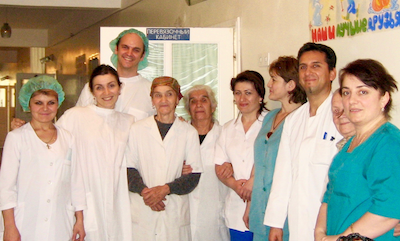Stabilizing Health in North Caucasus.

In 2004, 330 hostages—including 186 children—were killed in a school siege in Beslan, a town in the Russian autonomous republic of North Ossetia, in the North Caucasus. In the aftermath, the local children’s hospital found itself without the equipment or expertise to treat the more complex injuries suffered by survivors, especially children, from the rockets and tank fire used to break the siege.
Seeing that the inability to provide care was itself the result of past violence, Karsten Lunze (SPH’13), assistant professor of medicine at the School of Medicine, and his wife, Fatima, established the NGO Health for the Caucasus, working to strengthen health care for those directly and indirectly affected by violence in the region. For those efforts, the couple will receive the Victor Sidel and Barry Levy Award for Peace from the American Public Health Association (APHA) at the APHA Annual Meeting & Expo in Atlanta on November 7.
![]() Fatima Lunze, a pediatrics instructor at Harvard Medical School and Boston Children’s Hospital, is from the North Caucasus, and had been involved in humanitarian aid in the region. But after the school siege, it became clear to the couple that violence and healthcare are caught in a vicious cycle.
Fatima Lunze, a pediatrics instructor at Harvard Medical School and Boston Children’s Hospital, is from the North Caucasus, and had been involved in humanitarian aid in the region. But after the school siege, it became clear to the couple that violence and healthcare are caught in a vicious cycle.
“Conflict upsets the whole healthcare system,” says Karsten Lunze, who is also a preventive medicine physician and researcher at Boston Medical Center. Decades of conflict in the North Caucasus means “there’s no continuous medical education, so there are shortages in the training of medical personnel,” he says. That in turn means the local healthcare system is less capable of treating the victims of the next war or terror attack.
With colleagues from his native Germany, the Lunzes work with local hospitals, the Russian ministry of health, and international partners, to build up specialized healthcare services in the Caucasus. That includes bringing in equipment and technology, and providing specialized training on-site and international trainings in Germany and France.
“Violent conflict and wars not only affect the victims immediately,” Lunze says, “but also in the long-term once the conflict is over, and sometimes even for generations to come, because their students are not as competitive to train at the better institutions or to get training abroad.” Helping not only leading doctors and specialists in the region, but also the next generation of physicians, he says, means “they get the chance to catch up and to be more capable of running their own healthcare system.”
With their partners in the Caucasus and their colleagues, the Lunzes also report their analyses, implementation strategies, and operational results in international journals, providing resources for similar work in other parts of the world.
The Lunzes previously received a United Nations Humanitarian Medal for this work in 2016. Also in 2016, Karsten Lunze received the American College of Preventive Medicine’s (ACPM) Arnold P. Gold Foundation Humanism in Medicine Award.
Lunze holds an MD and a PhD from Charité Medical School in Berlin, Germany, an MPH from the Harvard T.H. Chan School of Public Health, and a DrPH from SPH. “I directly apply a lot of the professional skills that I learned in the DrPH program in our volunteering efforts,” he says. “Part of my training was to help strengthen management and leadership in the health sector, and that’s something that we’ve developed and implemented in the North Caucasus and in other places.” He says he recently went to Iraq with Khelda Jabbar (SPH’08), an assistant professor at BMC, to teach an abbreviated form of the same management and leadership curriculum. The skills from his DrPH have also been vital to his work as global health research faculty in the Section of General Internal Medicine at BMC, he says. His own research focuses on HIV in marginalized populations, and global maternal and child health.
“We didn’t set out as peace activists,” Lunze says in reaction to receiving the APHA award. “Since we started this work, the global security situation has deteriorated even further, and as public health professionals we have a mandate to take part in the prevention of war and violent conflict and the mitigation of its consequences.
“We have a role in both helping to stabilize the health system and also to establish a more stable society.”